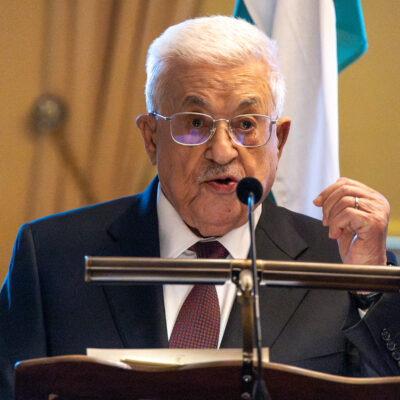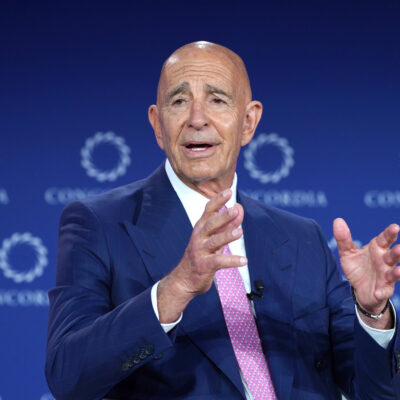
Kenny Holston-Pool/Getty Images
Wary Jewish Democrats see flashback to Obama in dissection of Harris’ views on Israel
Harris’ rhetoric indicates that she would not stray from Biden’s long-standing support for Israel, though she has adopted a more empathetic tone toward the plight of Palestinians in Gaza
CHICAGO — Hours before Democrats gaveled in the start of the Democratic National Convention at the United Center, Jewish Democratic activists gathered elsewhere in Chicago — at a location kept private due to security concerns — for a discussion about what the election means for Israel.
At a panel hosted by the Jewish Democratic Council of America, Liz Schrayer, president and CEO of the U.S. Global Leadership Coalition, asked former U.S. Ambassador to Israel Tom Nides the question many Jewish Americans have been pondering since Vice President Kamala Harris’ surprise ascension to the top of the ticket last month: Do you trust her on Israel?
“She’s not Joe Biden,” Nides acknowledged. “I mean, Joe Biden is of a different age, of a different generation. I love him dearly, but she’s not Joe Biden, and that’s OK.”
Instead, Nides continued, Harris’ relative youth — at 59, she is a generation younger than Biden — is an asset when it comes to Israel: She can reach the young people who are deeply disillusioned with Israel and America’s support for the Jewish state.
“There’s no better person who can articulate the views of why Israel needs to be secure, the importance of it, for this next generation, than Kamala Harris. She is the bridge to the future,” Nides argued. “If we have any hope whatsoever to turn this tide of what’s going on right now, we should all recognize — we’re in a very deep hole. It’s her faith and her positions and her views on the state of Israel, which I strongly believe is the only hope we have, in my humble view, of turning the kids that are under 30 years old back in support of the state of Israel and security of the state of Israel.”
He concluded by stating that he does trust her on Israel: “100% yes,” Nides said.
This unusually frank public conversation reflects the particularly intense scrutiny of Harris’ positions on Israel and the Middle East that has followed her since President Joe Biden left the race a month ago. The reading-between-the-lines amounts to a level of Talmudic parsing not seen since former President Barack Obama was in office, after two campaigns dogged by what Jewish observers deemed the “kishkes test”: Does Obama really support Israel in his kishkes — his guts? Harris has faced similar questions.

Taken at face value, Harris’ rhetoric indicates that she would not stray from Biden’s long-standing support for Israel, especially after the Oct. 7 Hamas attacks. “From when I was a young girl, collecting funds to plant trees for Israel, to my time in the United States Senate and now at the White House, I’ve had an unwavering commitment to the existence of the state of Israel, to its security and to the people of Israel,” Harris said in July after a meeting in Washington with Israeli Prime Minister Benjamin Netanyahu.
But politicians’ words are rarely taken at face value, particularly when it comes to the Middle East. Harris has adopted a more empathetic tone toward the plight of Palestinians in Gaza, though she usually couples her comments with pro-Israel language. Clips of the latter part of Harris’ July speech, in which she expressed her “serious concern about the scale of human suffering in Gaza,” spread quickly in less-progressive parts of the Jewish community. Her campaign has also expressed an openness to keep in touch with the organizers of the Uncommitted National Movement, which urged Democrats to vote against Biden in the primaries over his support for Israel.
“There’s such a focus on every word or sentiment, but broadly speaking, she’s very staunchly pro-Israel and ensuring that Israel has what it needs to defend itself and remain secure, and I don’t think that there’s going to be any sort of significant change from where this administration is,” a former staffer in Harris’ vice presidential office told Jewish Insider. “Some of the space between her and the administration’s policy — I think a lot of it is overstated.”
Activists on the left and right have focused their attention on Harris’ advisors, arguing that their past writings and career experience may provide evidence for how Harris could shape her own beliefs. Harris came into the presidency with some foreign policy experience — she had served on the Senate Intelligence Committee, and her foreign travel included a visit to Israel in 2017 — but that was not a key part of her background.
Much of the scrutiny on her team has focused on Phil Gordon, Harris’ national security advisor, who is closely associated with the 2015 Iran nuclear deal and who has at times been critical of American sanctions policy on the Islamic Republic.
“She is advised by a range of people with diverse views, and their previous writings reflect their personal views,” an aide to Harris told JI. “Anyone looking to understand the vice president’s worldview should look at what she has said and done on the world stage.”
Harris’ other two top foreign policy aides, Dean Lieberman and Rebecca Lissner, have received less attention — perhaps a result of the fact that they have fewer public writings and statements to parse.
Lissner, who serves as No. 2 to Gordon, started in the White House at the National Security Council, helping author Biden’s national security strategy, which called for a “more integrated Middle East that empowers our allies and partners [and] will advance regional peace and prosperity.”
Lieberman, who oversees Harris’ foreign policy communications and speechwriting, also started at the NSC before joining Harris’ team midway through 2021 and traveling with her on every foreign trip since. A former State Department civil servant who served in Jerusalem and, later, as press secretary for Sen. Dianne Feinstein (D-CA), Lieberman has been an informal liaison to the Jewish community for Harris for several months.
“I think that there are people in our community who are feeling very nervous about things because of advisors that she has around her, but there are also advisors around her, like Dean Lieberman, who I agree with, tactically, who views the situation in the Middle East similarly to me,” said Sam Lauter, a pro-Israel Democratic activist in the Bay Area.
Meanwhile, after Harris named Ilan Goldenberg, a Middle East foreign policy hand who until earlier this year had been her top advisor on Israeli-Palestinian issues, as her campaign’s Jewish outreach director, some hawkish voices attacked him for also coming from the same pro-diplomacy, Obama-era camp as Gordon. Goldenberg’s elevation to that position “should alarm every friend of Israel,” Jerusalem Post Editor-in-Chief Zvika Klein wrote in an editorial.
Speaking at an event on the sidelines of the Democratic National Convention earlier this week, Goldenberg touted the vice president’s support for Israel. “I can tell you a couple of things about her,” said Goldenberg. “One, from the very beginning, she was completely adamant that Israel has a right to defend itself. Israel was attacked on Oct. 7, and Hamas is a terrorist organization, and we’re going to be behind Israel supporting its response. And two, this is just part of a much longer record of hers that she has an unwavering commitment to Israel’s security that goes back long before Oct. 7.”
Harris has said little about what her approach to foreign policy would be as president, surely a political calculation designed to not mess with the positive energy her campaign has generated from across the Democratic spectrum. She has been a loyal steward of Biden’s vision as his vice president, and the remarks she has given so far indicate that she stands by him. But in the absence of any statements of actual policy on the Middle East, questions remain — and both supporters and detractors are left to fill in the gaps.
“I don’t like the kishke [or] not kishke kind of thing, because I feel that it reduces very important foreign policy challenges to the point that they don’t matter,” said David Makovsky, a distinguished fellow at The Washington Institute for Near East Policy. “There’s no shortcuts here. We need to hear the candidate herself talk about her foreign policy vision. We need to know how she sees America’s role in the Middle East.”
A few examples: Would she continue to pursue Israel-Saudi normalization? (As a senator, she was critical of Saudi Arabia’s human rights record, but so was Biden, who vowed in his presidential campaign to make the kingdom a “pariah”; he has since reneged on that position as president.) How vigorously would she pursue a nuclear deal with Iran? Would she follow Biden’s lead and continue to recognize Israeli sovereignty over the Golan Heights, a policy implemented by former President Donald Trump?
“We’re not going to address hypothetical policy questions,” the Harris aide told JI. “She remains the vice president of the United States and stands by the Biden-Harris administration policies in the region.”
Instead, the aide outlined Harris’ core beliefs on Israel.
“Here are the facts: The vice president has a lifelong and unwavering commitment to the security of Israel and will never leave Israel to stand alone,” the aide said. “She will always ensure Israel has what it needs to defend itself against Iran and Iran-backed terrorists like Hamas, Hezbollah, and the Houthis. And she is now actively participating in military preparations to directly defend Israel against a potential attack from Iran and Hezbollah.”
Despite Harris sharing some advisors with Obama, her backers in the Jewish community see a key difference between the two politicians. Obama, as Lauter and other Harris boosters pointed out, was an upstart candidate who was not as widely known among American Jews when he first ran as Harris now is. She first traveled to Israel in 2004 with the Bay Area Jewish Community Relations Council.

“I think people are concerned about similarities in advisors more than the facts of her track record. President Obama didn’t have as long a track record with the community,” explained Lauter, who has known Harris for more than two decades. “She was in the Senate longer than he was, and she has more of a voting track record. She has more of a track record of engagement with the pro-Israel and Jewish communities in California, as the attorney general and in San Francisco as the district attorney. So I don’t see similarities in President Obama and Vice President Harris when it comes to their histories and where they’ve been for the community.”
In a position paper Harris wrote during her 2016 campaign for Senate, she described her “commitment to Israel” as “unequivocal,” according to a copy of the document obtained by Jewish Insider. She pledged that in the Senate she would be a “staunch ally and outspoken supporter of Israel as we work together toward a secure, just and lasting peace.” In 2017, the first resolution she supported as a senator, soon after she was sworn in, was a measure opposing Obama’s December 2016 decision to break with longstanding U.S. policy and abstain from a United Nations Security Council vote condemning Israeli settlements. She later touted that vote at an AIPAC speech.
“They both get heat from parts of the community, but I don’t think there are actually a ton of similarities,” Jarrod Bernstein, a former White House staffer who served as Obama’s liaison to the Jewish community, said of the difference between his former boss and Harris. “He had a deep connection with the Jewish community when he came to office, but came up so quickly that it wasn’t the length and depth that the vice president has.”
Far-left activists who threatened to sit out the election over Biden’s support for Israel have warmed to Harris, even expressing cautious optimism about her candidacy. But her team has asserted that she is just listening to them, as she is listening to voters from a range of backgrounds; after two Uncommitted activists talked to her at an event in Detroit earlier this month and said she expressed openness to meeting with them to discuss an arms embargo on Israel, Gordon quickly tweeted that Harris strongly opposes an embargo.
“The question is whether or not the rhetorical frame is going to be translated into something that normal people would regard as a different approach to Israel,” said Aaron David Miller, a former State Department official who is now a senior fellow at the Carnegie Endowment for International Peace. “I just don’t see a major train wreck, or the U.S.-Israeli relationship emerging as it did, even in the Obama years, even though Obama presided over a very generous military assistance package.”
Biden has largely avoided public fireworks with Netanyahu, even as he has taken issue with Netanyahu’s handling of the war in Gaza — whereas Obama, his former boss, occasionally clashed with the conservative prime minister. Harris, like Biden, has not gone after Netanyahu directly, even if she has offered some blunt criticism of the devastation in Gaza and Israel’s role in it.
For now, the Harris campaign’s overtures to anti-Israel activists appear to be largely symbolic. In Chicago, both pro-Israel and anti-Israel Democrats will be closely watching how speakers at the convention address the war in Gaza. On Monday night, Biden and Rep, Alexandria Ocasio-Cortez (D-NY) called for a ceasefire-and-hostage deal, but neither shared many details.
“It’s this thing called illusion of inclusion, and it’s sort of like, ‘Yeah, we’re gonna listen to you. We’re gonna listen to your position,’ and then these outside groups can say, ‘We had a seat at the table,’” said Brian Katulis, a senior fellow at the Middle East Institute. “It’s all about political positioning rather than taking clear policy positions, the usual kabuki theater a few months before an election.”
Writing in The New Yorker in August, the journalist Jay Caspian Kang asked: “How generic can Kamala Harris be?”
“The vice president has answered few direct questions since becoming the presumptive nominee,” Kang wrote. “This is probably good for her campaign, but not for voters.”
She isn’t likely to start answering those questions soon when it comes to Israel and Gaza, one of the most divisive issues among Democratic activists. So for now, Harris’ friends and foes alike are left with the same strategy: Reading the tea leaves and filling in the gaps themselves.
Please log in if you already have a subscription, or subscribe to access the latest updates.






